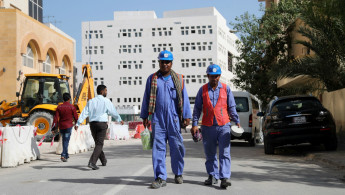Saudi Arabia dismisses talk of migrant labour reforms
Saudi Arabia's Ministry of Labour and Social Development took to Twitter on Sunday dismissing recent rumours that Riyadh might be planning to abandon the much-criticised Kafala sponsorship system for migrant workers in the country.
A message posted on the account, which is managed by official ministry spokesman, Khalid Aba Al-Khail, in response to an enquiry stated simply that "a decision to this effect" had not been issued.
Saudi Arabia is regularly criticised for its continued practice of the Kafala system, forms of which also exist in countries including Lebanon, Bahrain, Jordan, Kuwait, Oman and the UAE.
According to the system all unskilled labourers must have in-country sponsors, usually their employers, who are responsible for their visa and legal status.
Rights groups say that this system provides easy opportunities for exploitation with many employers taking away passports and abusing their workers with impunity, with little risk of legal repercussions.
For such reasons in extreme cases the Kafala system has been called a modern form of slavery.
The Labour and Social Development Ministry's comment on the issue comes at a time when Deputy Crown Prince Mohammed has announced ambitions plans, under the title "Vision 2030", to reform Saudi Arabia's economy and society, and some regional states have committed to reform their migrant labour systems.
In April Bahrain is set to introduce a new labour system that will provide monthly work permits to more than 52,000, following in the footsteps of Qatar which announced that it had abandoned the system late last year, also adopting a contract-based law.
However, Amnesty International has poured scorn on alterations to labour laws made in Qatar arguing that the new law "may get rid of the word 'sponsorship' but leaves the same basic system intact" and will, for example, still require migrant workers seek their employer's consent in order to return home.
Millions of migrant workers — mainly from South Asia in addition to other Arab states such as Lebanon, Sudan, and Egypt — work in the Gulf and Saudi Arabia. In Saudi Arabia 99.6 percent and 94.8 percent of all domestic workers and personal assistants are migrant workers.


![President Pezeshkian has denounced Israel's attacks on Lebanon [Getty]](/sites/default/files/styles/image_684x385/public/2173482924.jpeg?h=a5f2f23a&itok=q3evVtko)



 Follow the Middle East's top stories in English at The New Arab on Google News
Follow the Middle East's top stories in English at The New Arab on Google News


